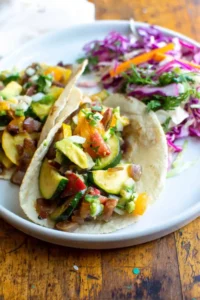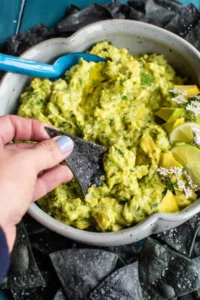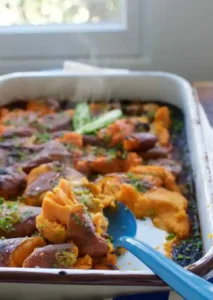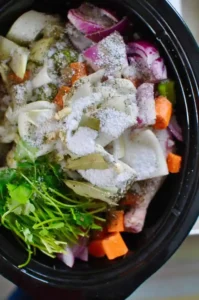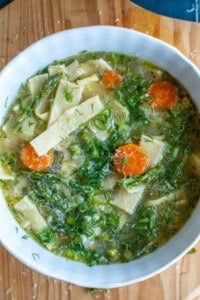14 Must-Have Kitchen Tools Every Home Cook Needs
As a published cookbook author and former professional chef, I’ve tested out MANY kitchen tools. And this list of must-have kitchen tools and equipments names is a great place to start if you’re a beginner cook, are creating a registry, or are shopping for a gift for someone who likes to cook (or wants to learn).

I’ve been cooking and baking for as long as I can remember. And with more than 10 years cooking professionally, 5 years as a food editor, over 1,100 recipes on my sister website, ¡Hola! Jalapeño, more than 100 recipes here on Kate’s Best Recipes and my book, you can bet I’ve gone through my fair share of kitchen tools! Along the way, I’ve learned exactly what works best and why; which tools are essential for cooking (and which tools you can live without); as well as which brands provide the best quality and value for the price.
Consider this your one-stop-shop for stocking a kitchen, narrowed down to the 14 most essential kitchen tools and equipments names.
The 14 Kitchen Tools I Use Everyday
All of the kitchen tools in this list are items I own. I list 14 here but some include more than 1 item. Use your best judgment on which items you would use based on my descriptions. None of this post is sponsored—truly just items I love and am happy to recommend to fellow home cooks. A lot of these links are affiliate links.
1. A High-Quality Knife Set
What I use: Wusthof Knife Set
Quantity I recommend: 1 set that consists of at a minimum, a Chef’s knife, paring knife, and serrated knife.
Of all the kitchen utensils this is the most essential. You’re going to have a hard time cooking anything without a sharp knife. All home cooks need to have at least one good Chef’s knife that can keep a sharp edge. Slicing with a dull knife is so much harder, leading to frustration and the feeling that cooking is too time consuming and challenging.
If all you can afford is a sharp Chef’s knife, start there. A high-quality Chef’s knife that is made from stainless steel construction will make your life significantly easier in the kitchen. Just remember to sharpen it frequently.

2. Cutting Board
What I use: Boos Block
Quantity I recommend: 1-3
At a minimum you will need one cutting board but ideally you will have one wood cutting board for everyday veggies/fruit/bread, one plastic cutting board for raw fish/meat, and one wood cutting board with a juice groove for carving cooked meats like Porchetta or Thanksgiving turkey.
The cutting board needs to be large. At least 24 x 18-inches. Don’t torture yourself with a tiny cutting board that gives you no room to cut anything on.
If you can only afford one, make sure you are following this important food safety rule: Never cut vegetables or fruit on the same cutting board that you just cut raw meat or fish on. You must wash the cutting board with hot soapy water immediately after cutting raw meat or fish before using it again.


3. Dry Measuring Cups
What I use: Cuisinart set of 4 measuring cups
Quantity I recommend: 1-3
Ideally you want to have a set of dry measuring cups, measuring spoons, and liquid measuring cups of different sizes. Measuring cups and spoons are essential tools for precise measurements when following a recipe, especially in baking.
If you can only do one, use dry measuring cups for dry ingredients as well as liquid (although it won’t be as accurate) but these are some of the least expensive kitchen essentials you will buy, so why not get all three. I love the slim design of these teaspoon and tablespoon which easily fit inside spices.
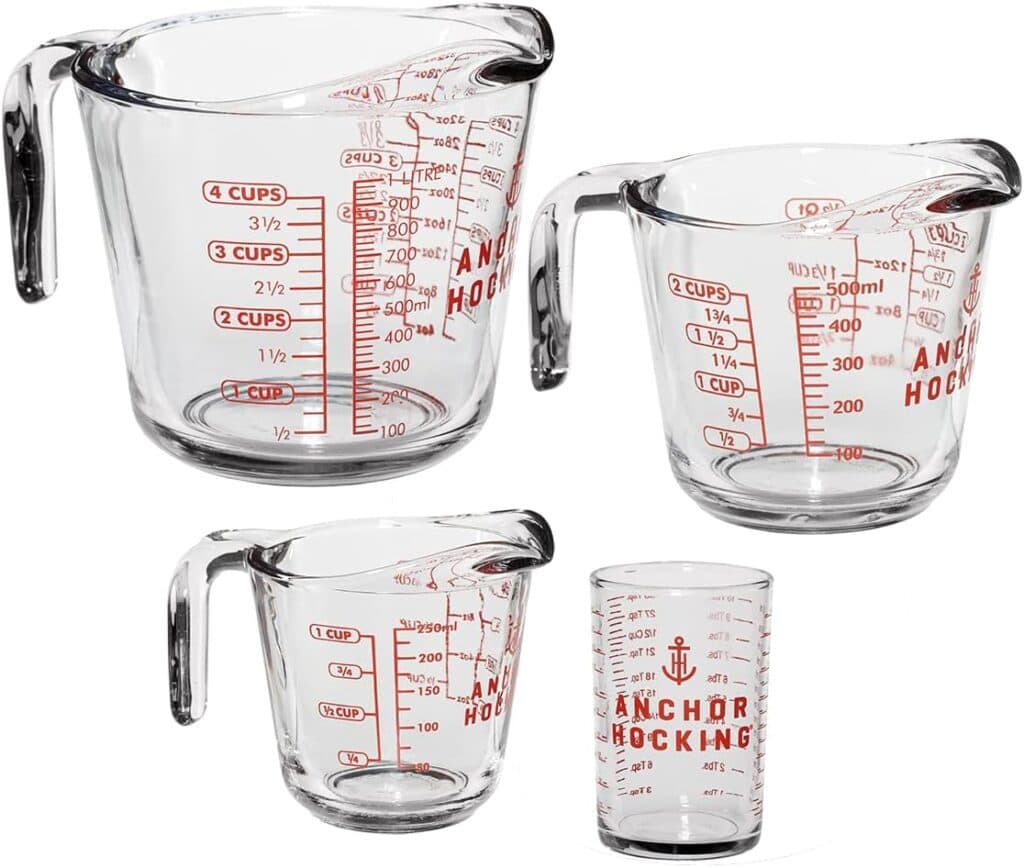


4. Good Quality Saute Pan
What I use: All-Clad 12-inch saute pan
Quantity I recommend: 1-4
I could go on and on about all the different pans you could get and the benefits of each but if you are just starting out and need one good frying pan, I suggest getting a stainless steel skillet with a lid. Make sure it is oven-safe (meaning no plastic handle), has a heavy bottom that can stand high heat and it should be 12 inches wide to give your food plenty of room for browning and for making things like stir-fry.
If you are in the market for more than one pan, other good ones to get are a nonstick skillet; either a cast iron pan or a nonstick ceramic pan. Then consider buying pans of different sizes, like a small nonstick skillet for frying eggs or a large 14-inch saute pan for larger cooking jobs.



5. Dutch Oven
What I use: 5 1/2-quart Le Creuset Dutch Oven
Quantity I recommend: 1
One of my most prized possessions is my collection of Le Creuset Dutch ovens. You might have noticed me use them to make Homemade Egg Noodle Soup and Red Wine Braised Beef.
Of course you only need one but once you start cooking with them, you’ll get bit by the Le Creuset bug too. You certainly don’t need a Le Creuset Dutch oven, but you’ll want one that has a heavy bottom and a tight-fitting lid for making stews like German Goulash. Buy one that is cast iron or enameled cast iron that can go from the stove top to the oven.
One last thing I’ll say about Le Creuset, they are indeed expensive but they will last a very long time, like for many generations so it is definitely a good investment.

6. Baking Dish
What I use: Pyrex glass baking dishes with lids
Quantity I recommend: 1-3
From baking to marinating to casseroles like creamy chicken noodle casserole, baking dishes serve many purposes in the kitchen. I love the Pyrex baking dishes because they have locking lids that fit snuggly on top of the dish for easy storage or travel.
If you only have one baking dish, I recommend starting with a 9×13-inch sized casserole dish. This size is large enough for food preparation tasks like marinating meat but also doubles as cake pans or baking casseroles.

7. Blender
What I use: Vitamix Blender
Quantity I recommend: 1
A blender may seem like an unnecessary item, but honestly I use mine every day. From smoothies in the morning to salsas, soups, sauces, and marinades at night.
You don’t need a fancy high-powered blender. I used an Oster blender happily for many years. But I will honestly say, my Vitamix is truly worth every penny. I can blend anything and everything effortlessly and the high-powered blades turns it into a light, fluffy, and ultra-smooth puree. Much better than any blender or food processor I’ve ever used.

8. Food Storage Containers
What I use: Pyrex glass storage containers
Quantity I recommend: 1 good set that has various sizes
For storing leftovers in the refrigerator and freezer or if you are doing food prep I love these glass containers that are stackable. Pyrex has a variety of shapes and sizes and I’m pretty sure I own them all.

9. Wooden Spoons
What I use: Teak wooden spoon set
Quantity I recommend: 1-3
A wooden spoon is indispensable in the kitchen. I probably have a dozen or more I’ve collected over the years. Many were my grandmothers’. For very basic cooking you only need one with a nice long handle to reach the bottom of the deep stock pot (see #13). But a good set that has a flat-edged spoon (for scraping) as well as rounded-edge ones is a very “nice-to-have”.

10. Baking Sheet
What I use: USA Bakeware Half Sheet Pan
Quantity I recommend: 1-3
The baking sheet (or sheet pan) is essential from baking cookie dough into cookies, roasting veggies, or making sheet pan meals. Get ones that are heavy for their size, are rimmed, and are made of aluminized steel. I like the 12×17-inch size but the quarter sheet pans (9×13-inch) are great for small jobs.

11. Vegetable Peeler
What I use: Kuhn Rinkon Peeler
Quantity I recommend: 1-2
Peeling vegetables and fruit is a daily task and if you don’t already have a Y-Peeler (a vegetable peeler in the shape of a “Y”) you aren’t doing it right. Y-peelers have been the go-to peeler in restaurant kitchens for decades but still haven’t quite made it into home kitchens yet.
What makes them so special? They work for righties and lefties, have a round comfortable handle, weigh practically nothing and cost even less. They are extremely durable too. The one I use I’ve had for at least 10 years if not longer. If you live alone you only need one, but three come in the package which means you have enough peelers to elicit help in the kitchen.

12. Citrus Squeezer
What I use: Imusa Manual Squeezer
Quantity I recommend: 1
Of all the kitchen gadgets listed, this may be the most questionable in terms of if you really need one or not. I use mine practically every day and once you buy one, you will too. Squeezing lemons and limes for fresh citrus juice instead of using store-bought juice will elevate your cooking.
I like the standard citrus squeezer. Don’t buy the one that has the smaller insert for limes, it’s cumbersome and most limes (unless they are key limes) are too big for that compartment. By the way, the fruit goes in, cut-side-down. Apparently there’s been some debate about that.

13. Stock Pot
What I use: Viking 12-Quart Stock Pot
Quantity I recommend: 1
From cooking pasta to making big batches of soup, you need a large stock pot to do some serious cooking. The mistake a lot of beginner cooks make when buying kitchen equipment is they go small. From cutting boards to sauté pans to stock pots, the bigger the better. you need a lot of room to properly (and easily) cook even everyday meals not to mention, dinner parties and holidays.
I like this 12-quart stock pot. It is big without being enormous, has a nice heavy bottom, has a tight-fitting lid and is made from long-lasting stainless steel.

14. Can Opener
What I use: KücheCraft Manual Can Opener
Quantity I recommend: 1
Have you ever bought a can of something only to realize you don’t have a can opener to open it? This is how important a can opener is in a kitchen. It can be the difference between cooking a particular dish, or not.
I like a simple manual can opener. They last forever, are easy to clean, and less expensive.

Let Me Know Which Kitchen Tools You Can’t Live Without!
Leave me a comment below, I’d love to know. 🙂


